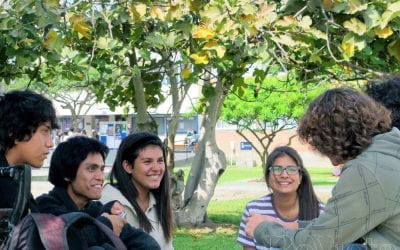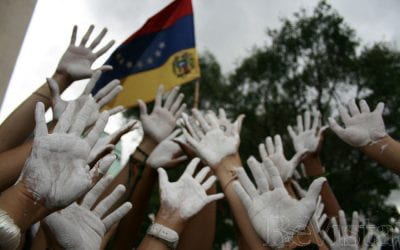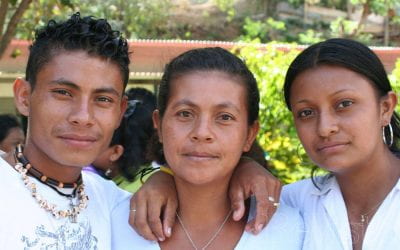From War to Progress
Universidad del Valle de Guatemala-Altiplano

The view from the Universidad del Valle-Altiplano campus of Lake Atitlán in Guatemala. Photo courtesy of Roberto Moreno.
María del Carmen Cumatz is an elementary school teacher from a small town in the Guatemalan highlands in Sololá. In 2006 she became the first member of her family to obtain a university degree when she graduated with a teaching certificate from the Universidad del Valle de Guatemala-Altiplano. Although teachers are not required by law to go to college (they are still certified by special institutes at the secondary level called Normal Schools), she wanted to be better prepared to make a difference in her students´ lives. Opportunity arose when she heard about a scholarship program offered by Del Valle with the support of USAID. After four years of attending a weekend program, she finally achieved her goal. All of her family proudly joined her for commencement. They never thought that such an accomplishment would be part of their lives.
Many such personal achievements are happening in this small university campus in the Guatemalan highlands. The site—the former Military Base of Sololá during the 36-year internal conflict—is now a place where education translates into development. In 1999, as a result of the Peace Treaties signed in 1996 in this Central American country, the Guatemalan government leased the premises of the former military base in the small village of El Tablón to the Universidad del Valle de Guatemala to create an educational center. A symbol of war has been transformed into a representation of democracy and progress, training educators, technicians and engineers.
Del Valle, founded in 1966, is a private, non-denominational, leading university in science, technology and education in Guatemala. When it received the facilities of the former military base over a decade ago, its goal was to reach out to the largely Mayan population of the region through the implementation of educational, research and extension programs. During the past twelve years, Del Valle University has kept busy transforming the former barracks into lecture halls, dorms, science laboratories, distance learning facilities and research premises. The shooting fields have been transformed into agricultural experimentation plots. The effort has translated into community development programs, renewed agricultural practices, entrepreneurship, teacher training, food safety, health training, learning English, and capacity building.
The support of individuals, institutions, organizations and international aid has provided the necessary funds for scholarships, research, equipment and infrastructure. UVG seeks to provide individuals, families, and communities with opportunities for higher education. Social, economic, political and cultural barriers are being torn down and educational programs are having an impact on the quality of life of the indigenous Guatemalan population.
One of the most impressive sites on campus is a spot with a magnificent view of picturesque Lake Atitlán. Given this proximity, a campus research center was founded to contribute to the conservation of the lake. This body of water is not only a very significant part of the natural and cultural patrimony of the region; its basin also supports the various agricultural and economic activities of the communities, including tourism and extensive coffee plantations, as well as plots of corn, onions, beans, squash, tomatoes, cucumbers, garlic, strawberries, avocados and pitahaya fruit. Unfortunately, mistaken agricultural practices and the contamination produced by solid and liquid wastes poured directly into the lake have accelerated its deterioration, made all too evident by the florescence of cyanobacteria called lyngbya robusta. Since April 2010, a laboratory has monitored the lake’s water quality. Students have been actively involved in carrying out the various measurements and analyses.
Another important program on campus is conducted by the university’s Center for Rural Development, which focuses on community and citizen participation, sustainable environmental management and natural resources, health, food safety, formal and informal education, economic development, and transfer of science and technology within a sound cultural approach. Supported by various organizations, this Center has identified, documented and systematized 24 good practices. It has developed educational modules to share these practices with technicians, students, and community members with low schooling.
A language center also operates on campus, offering English and Kakchiquel to groups of various ages and needs. The English program is offered in Sololá, Panajachel, and San Andrés Semetabaj through the English Access Micro-scholarship Program with the support of the U.S. Embassy in Guatemala.
Centro de Emprendedores en Acción, an entrepreneurship program set up at the university, seeks improvement in local farming and industries, teaching how to seek improved economic opportunities, develop a business plan, incubate an idea and establish a service and support chain. Various businesses in the areas of agriculture, forestry, services and tourism have been promoted through this important initiative.
All these efforts are complemented and enhanced through a continuing education program, which provides training in health, nutrition, education, technology, tourism, environment, computer skills, decentralization and local power, and agroforestry. It is not rare to find a class of school children visiting the library and hearing a storyteller, a group of indigenous women participating in a workshop, or some local farmers receiving training in a particular field. Most beneficiaries come from the departments of Sololá, Totonicapán, Quiché, and Chimaltenango, although the participation of individuals coming from all the other departments is increasing every year. So far, about 50,000 persons have taken part in the various continuing education activities. Universidad para todos (University for All), a part of this initiative, offers non-formal education on environment, agriculture, education, technology, health, and nutrition. Classes are imparted on the last Saturday of every month, and participants pay only a symbolic amount of a little over a dollar (10 quetzales) per workshop.
Both elementary and secondary schoolteachers are being trained on campus, contributing to the improvement of the quality of education in the Guatemalan highlands. The university has led an effort to develop a new methodology for early reading and writing and is working very closely with teachers from Sololá, Quiché, Totonicapán and Huehuetenango, particularly with the support of USAID.
Professors, researchers and students from various American and European institutions have been attracted to UVG-Altiplano. It is frequent to see a group of visiting scholars on campus, paying attention to the interesting mix of science and technology, education, and multiculturalism. Besides this, being on campus is a life-changing opportunity to witness first hand the profound transformation that is taking place in the area: a vivid story of leaving war behind, working out differences and moving towards progress.
UVG-Altiplano has launched innovative models based on the actual needs and views of the surrounding communities. The Peace Treaties have come to life in a leading educational institution that is preparing technicians, engineers and schoolteachers, the future agents of change required for the development of the Guatemalan highlands.
Fall 2012, Volume XII, Number 1
Roberto Moreno is the President of Universidad del Valle de Guatemala.
Ronald Curtiss is a Mathematics Professor and Moreno’s student in a graduate program on Educational Coaching.
Related Articles
University Lessons: Editor’s Letter
I learned about universities on the barricades. Well, not exactly. I was a philosophy student at Barnard—the women’s college at Columbia University—when the uprising began in 1968. Students, including my boyfriend and several classmates, took over buildings to protest…
The Last Word
More than twice as many Latin Americans are attending institutions of higher education than two decades ago, and the number will continue to increase as more students graduate from secondary schools. ReVista’s timely focus on higher education is thought-provoking…
Making a Difference: A Problem With the UN Millennium Goals
Every Saturday for two years, Estevana Sánchez walked through the jungle for miles, in the dark, crossing a river in the rainy season, to finish high school. Her five teenage children did the same. At the end of the trail, they took a long bus ride to the town of San Juan del Sur…




